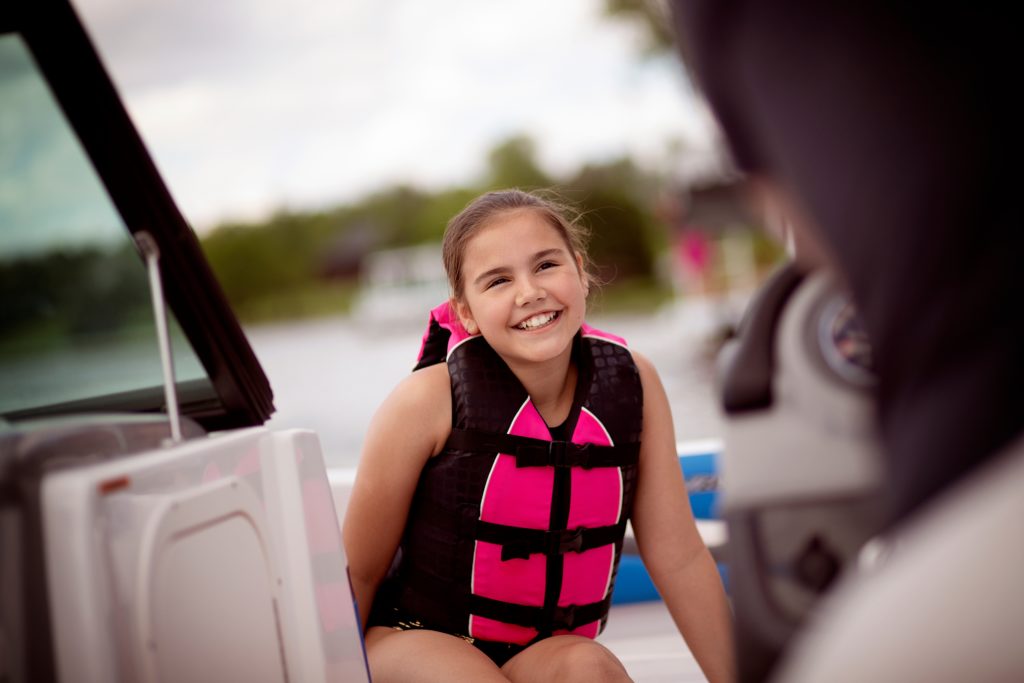[vc_row][vc_column][vc_column_text]
Boat Safety Checklist & Safety Equipment
[/vc_column_text][vc_column_text]Whether you’re using your boat for fishing, wakesurfing, skiing, diving, day cruising or overnighting, remember to pack essential safety gear. If you keep it onboard, inspect it periodically and keep it in good working order. Although the U.S. Coast Guard requires different items for different kinds and sizes of vessels, there is some basic gear that will help keep you safe and out of trouble with the authorities.
Here are a few must-haves as well as should-haves to stow aboard this boating season.
5 Must-Have Safety Equipment for Your Boat
[/vc_column_text][vc_column_text]1. Life jackets and wearable personal flotation devices (PFDs)
An accessible, wearable PFD (Type I, II, or III) is a life jacket that must be available for each person on board. If you’re towing a skier or have a wake surfer behind the boat, he or she will need a PFD as well. Kids 12 and under must always wear their PFD on a moving vessel. Likewise, everyone riding a personal watercraft (PWC) must also wear a PFD at all times. In case of an emergency of any kind, the first thing you should do is ensure that all passengers onboard immediately put on their life jackets—or proactively, you can recommend that all those onboard just put them on right at the dock before departure. Although not required, your pet should have a lifejacket, too.
Learn more in How to Choose the Right Life Jacket or PFD, or visit the USCG for additional information and resources.
2. Throwable flotation devices
In addition to the life jackets you wear, you’ll need at least one floating device (Type IV) that you can throw to an individual in the water in case of trouble. This can be a cushion, a ring buoy or other device and although only one is required, it’s better to have several. Some of these items may come with a line attached so you can pull a person closer to the boat and then get them out of the water.[/vc_column_text][vc_column_text]3. Fire extinguishers
There are different kinds and ratings for extinguishers but to keep it simple, remember that boats under 26 feet (including PWCs) need at least one B-1 type extinguisher and boats 26 to just under 40 feet need two B-1 types or one B-2 type. Discuss with your family and guests how to operate an extinguisher: pull the pin, squeeze the handle and aim at the base of the flames.
4. Visual signaling devices
Visual distress signals can come in a variety packages and there are different requirements by size of vessel and even by the state where you go boating. Boats under 16 feet must have flares or nighttime signals. Boats over 16 feet must carry visual signals for both day and night use. Examples of pyrotechnic devices or flares that would qualify are orange or white smoke and aerial light flares. Some flares are self-launching while others require a flare gun to send them into the sky. Other nighttime devices include a strobe light while flags may be used during the day. PWCs cannot be operated between sunset and sunrise so they don’t need to carry nighttime devices.
5. Sound signaling devices
Sounds can attract help both day and night and are especially effective in fog. Portable or fixed horns and whistles count as sound-generating devices for all boats. Larger vessels (over 39 feet) should also carry a bell to be sounded at regular intervals in times of limited visibility like fog.[/vc_column_text][vc_column_text]
For a Boating Accident Accident Lawyer- contact Sodhi Law Group today.
The Sodhi Law Group is a highly successful law firm located in Modesto, California. We specialize in Criminal Defense, Civil Litigation, Personal Injury, Contracts and Transactions, and many other legal services. Jak Sodhi, Ameet Birring, and their team of professionals offer more than 20-plus years of legal experience and over 90% successful court cases since 1999*.
This blog does not create an attorney-client relationship. This blog is legal information and should not be seen as legal advice. You should consult with an attorney before you rely on this information.
Have questions? Contact Sodhi Law Group at https://www.sodhilawgroup.com/ or (209) 263-4820. Also, follow us on FaceBook today. Or fill out the form below.
[/vc_column_text][/vc_column][/vc_row]


